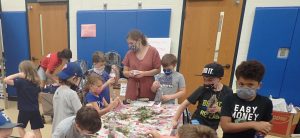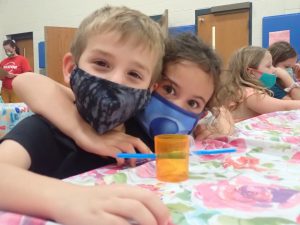Article by Sara Tomis ’22 (CAHNR)
 This summer, UConn 4-H New London County completed their first in-person program since early spring, 2020. The program focused on entomology and STEM and was facilitated through Preston Parks and Recreation summer camp. Students ranging from 4 to 12 years in age participated in a variety of activities designed to “break the ice” with bugs while learning about insect habitats, developmental stages, feeding behaviors, and anatomy.
This summer, UConn 4-H New London County completed their first in-person program since early spring, 2020. The program focused on entomology and STEM and was facilitated through Preston Parks and Recreation summer camp. Students ranging from 4 to 12 years in age participated in a variety of activities designed to “break the ice” with bugs while learning about insect habitats, developmental stages, feeding behaviors, and anatomy.
Although many younger campers were eager to get their hands dirty and learn by doing (even when this involved making ‘ant restaurants’ that combined a variety of sticky, creamy, and crunchy foods), older campers exhibited a limited interest in engaging with these activities early in the program. However, by the end of the summer, young and older campers alike were enthusiastic about trying new things, interacting with the natural world, and engaging with content that they were initially apprehensive about. Additional impacts resulting from this experience involved promoting science education and science-based careers to young women, as well as teaching young learners how to overcome their fears and insecurities during their pursuit of knowledge and growth.
 The 4-H Bugs program further served as an environment where students were able to develop a sense of community and teamwork. One student found a cicada exoskeleton at camp and brought his new ‘friend’ to 4-H Bugs program sessions over multiple weeks. His peers encouraged his newfound interest in entomology and together the group made a habitat for the exoskeleton and created paper ‘food’ for the exoskeleton to enjoy. The students applied what they had learned about insect diets and life cycles as they interacted with the exoskeleton, who was named Steven.
The 4-H Bugs program further served as an environment where students were able to develop a sense of community and teamwork. One student found a cicada exoskeleton at camp and brought his new ‘friend’ to 4-H Bugs program sessions over multiple weeks. His peers encouraged his newfound interest in entomology and together the group made a habitat for the exoskeleton and created paper ‘food’ for the exoskeleton to enjoy. The students applied what they had learned about insect diets and life cycles as they interacted with the exoskeleton, who was named Steven.
All students expressed increased interest in engaging with insects as the weeks progressed. The last session of the program involved creating habitats for live mealworms, which went home with students inside plastic water bottles filled with leaves, sticks, banana peels, and sheep grain for the worms to eat. The students were each allotted one mealworm each. However, as the worms were purchased in packs of 12, there were extra worms at the end of the session.
Almost all of the students asked for a second or even a third worm to add to their habitat and talked about their plans for feeding and caring for their insect as they moved on to their next camp session.
Cultivating positive interactions with peers and the natural world has a profound impact on how young students view their world and their future. The 4-H Bugs program was successful in providing such an experience to participants through experiential learning. Students benefited from an in-person learning modality after an extended period of time where their primary educational interactions took place in a virtual environment as a result of the COVID-19 pandemic. This program is reflective of UConn Extension’s commitment to improving the lives of residents and stakeholders through quality educational programming.